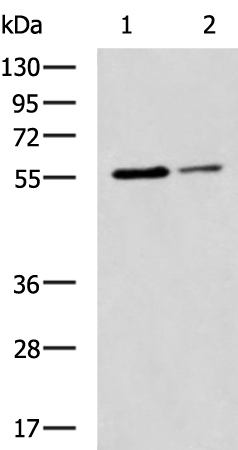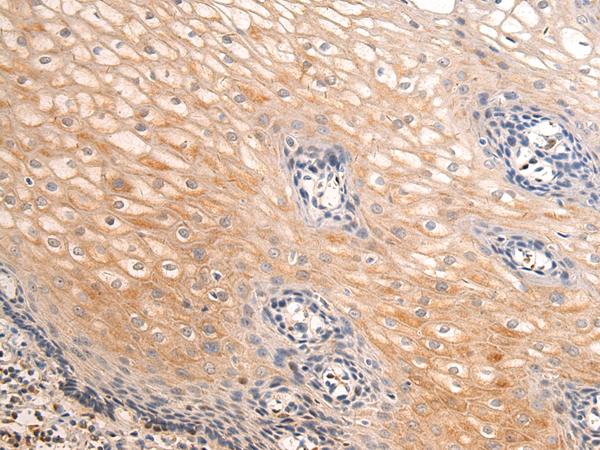

| WB | 咨询技术 | Human,Mouse,Rat |
| IF | 咨询技术 | Human,Mouse,Rat |
| IHC | 1/50-1/100 | Human,Mouse,Rat |
| ICC | 技术咨询 | Human,Mouse,Rat |
| FCM | 咨询技术 | Human,Mouse,Rat |
| Elisa | 1/5000-1/10000 | Human,Mouse,Rat |
| WB Predicted band size | 43 kDa |
| Host/Isotype | Rabbit IgG |
| Antibody Type | Primary antibody |
| Storage | Store at 4°C short term. Aliquot and store at -20°C long term. Avoid freeze/thaw cycles. |
| Species Reactivity | Human, Mouse |
| Immunogen | Synthetic peptide of human LAYN |
| Formulation | Purified antibody in PBS with 0.05% sodium azide and 50% glycerol. |
+ +
以下是关于LAYN抗体的3篇代表性文献的简要概括:
1. **"Layilin regulates CD8+ T cell exhaustion and anti-tumor immunity"**
- 作者:Sakuragi et al.
- 摘要:研究揭示了LAYN(Layilin)在肿瘤浸润性CD8+ T细胞中的高表达与T细胞耗竭的关联,并证明抑制LAYN可增强抗肿瘤免疫应答。
2. **"LAYN as a prognostic biomarker in tumor microenvironment"**
- 作者:Zhang et al.
- 摘要:通过免疫组化(IHC)分析多种癌症样本,发现LAYN在肿瘤相关成纤维细胞(CAFs)和调节性T细胞(Tregs)中高表达,提示其参与免疫抑制微环境的形成。
3. **"Targeting LAYN as a novel immune checkpoint molecule"**
- 作者:Wang & Smith
- 摘要:该研究提出LAYN可能作为新的免疫检查点分子,与PD-1/PD-L1通路存在协同作用,阻断LAYN可提升现有免疫治疗的疗效。
4. **"Layilin-mediated adhesion in immune cell trafficking"**
- 作者:Johnson et al.
- 摘要:探讨LAYN通过调控细胞外基质(ECM)相互作用影响淋巴细胞迁移的机制,为靶向LAYN改善免疫细胞浸润提供理论依据。
以上文献涉及LAYN在肿瘤免疫、微环境调控及治疗靶点中的功能,具体细节需查阅原文或PubMed/Google Scholar数据库获取完整信息。
LAYN antibody research focuses on Layilin (LAYN), a transmembrane protein identified in the early 2000s as a cell adhesion regulator. Structurally, LAYN contains a carbohydrate-binding domain that interacts with extracellular matrix components like hyaluronan, facilitating cell-matrix communication. It is highly expressed in immune cells, particularly regulatory T cells (Tregs) and exhausted cytotoxic T lymphocytes (CTLs), where it functions as an immune checkpoint modulator.
Studies highlight LAYN's dual role in immunity. In Tregs, it supports immunosuppressive activity, maintaining immune tolerance. Conversely, in tumor-infiltrating CTLs, elevated LAYN correlates with T cell exhaustion, impairing antitumor responses. This positions LAYN as a potential biomarker for dysfunctional T cells in cancers like melanoma and hepatocellular carcinoma. Therapeutic strategies targeting LAYN aim to reverse T cell exhaustion or inhibit Treg-mediated immunosuppression, potentially enhancing cancer immunotherapy efficacy.
Recent investigations also explore LAYN's involvement in autoimmune diseases and chronic inflammation, broadening its clinical relevance. Despite progress, mechanisms underlying LAYN's signaling and tissue-specific functions remain partially unclear, driving ongoing research to refine its therapeutic targeting. Overall, LAYN antibodies represent a promising tool for deciphering immune regulation and developing next-generation immunotherapies.
×